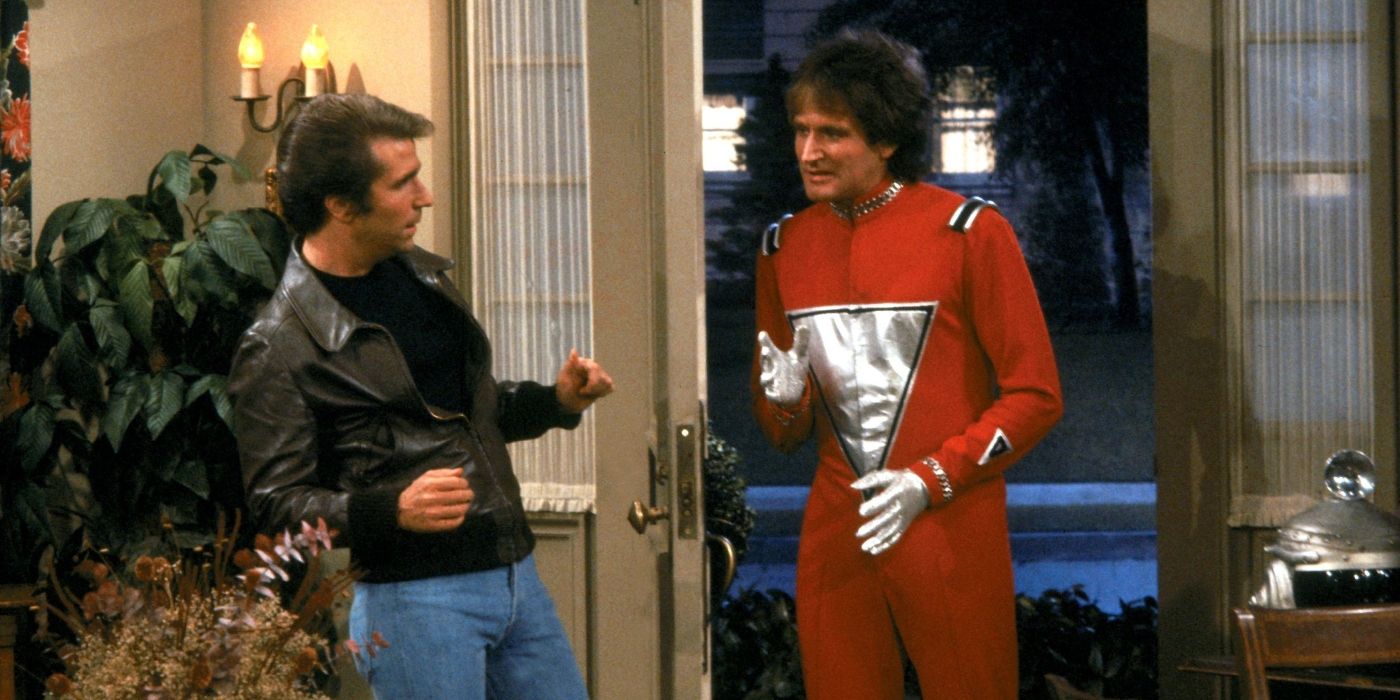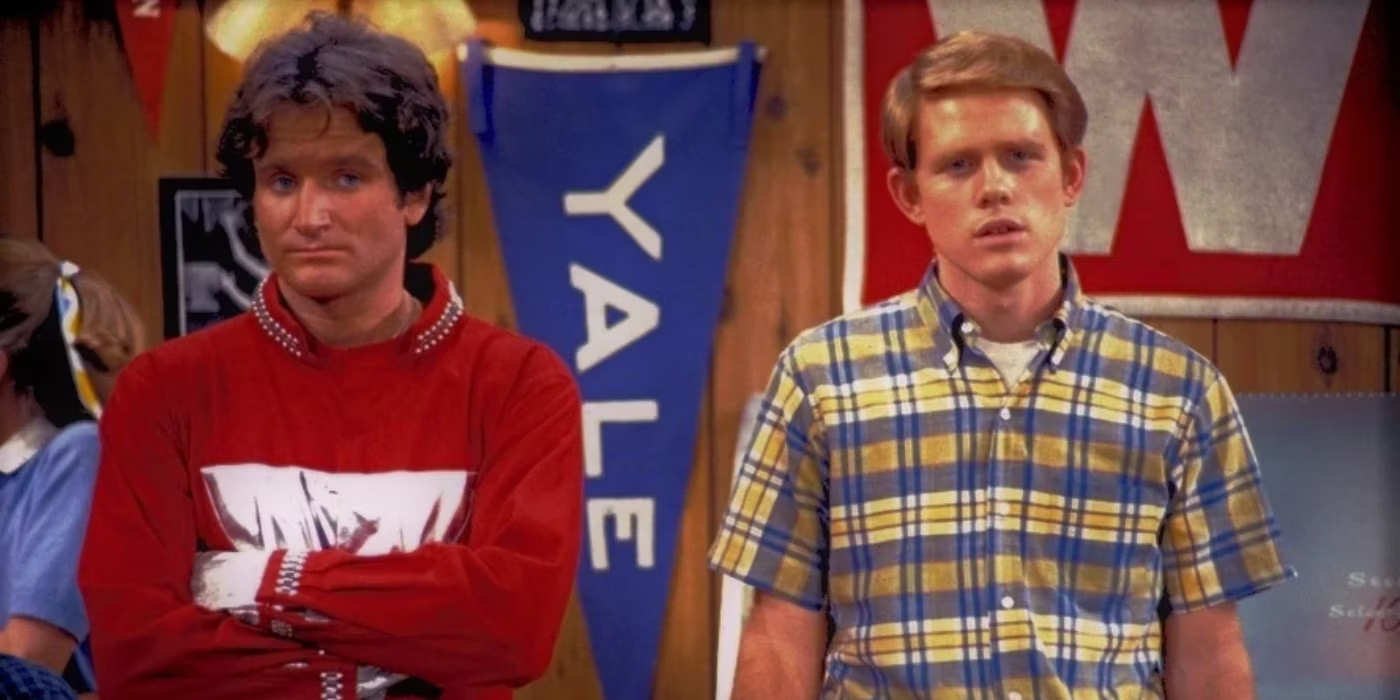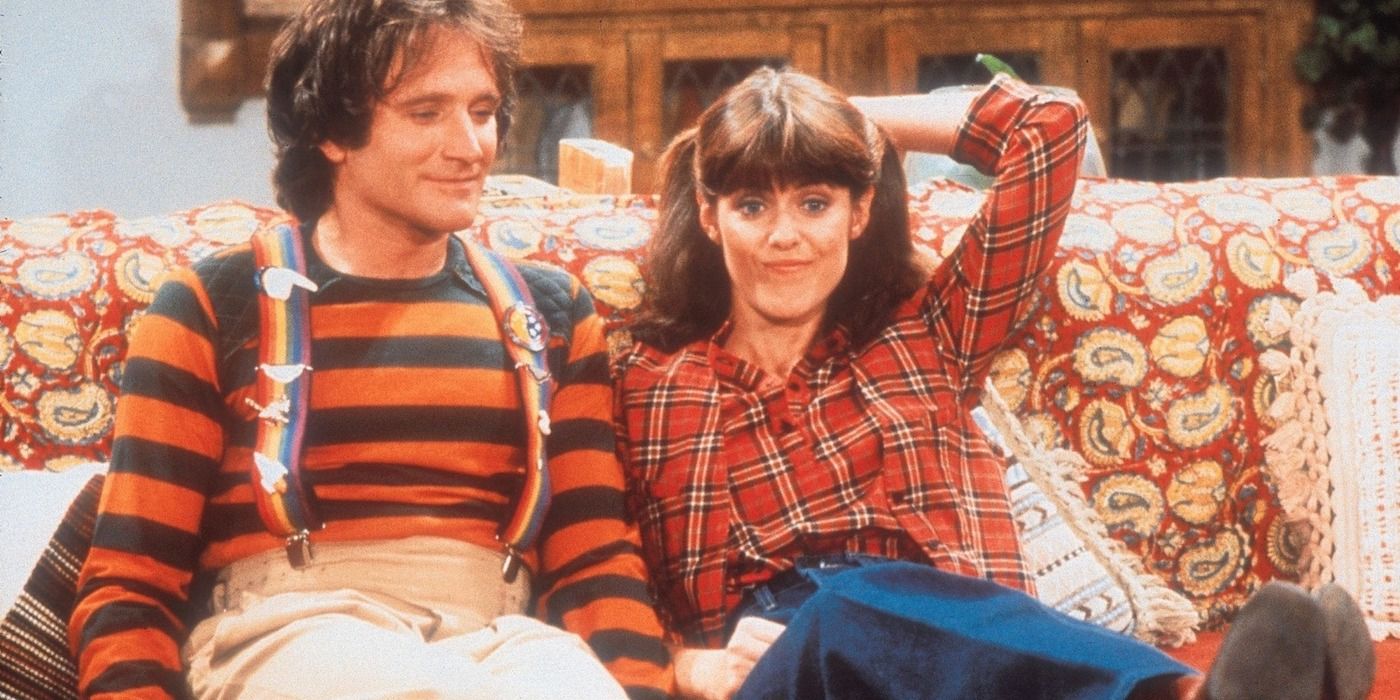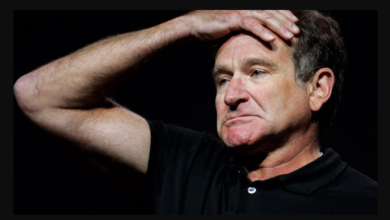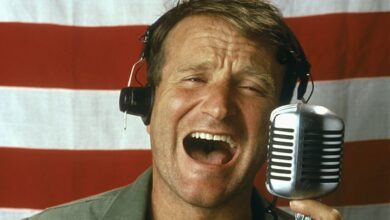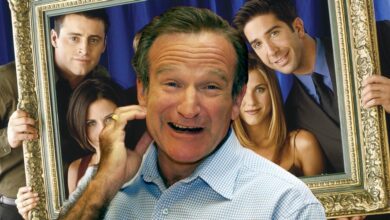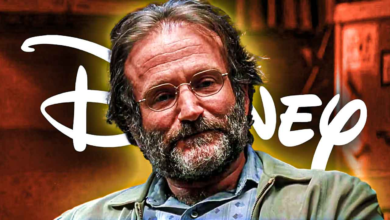Robin Williams Turned a One-Off ‘Happy Days’ Guest Spot Into His Breakout Role
Who could've expected an alien in a red jumpsuit would kick off such an iconic career?
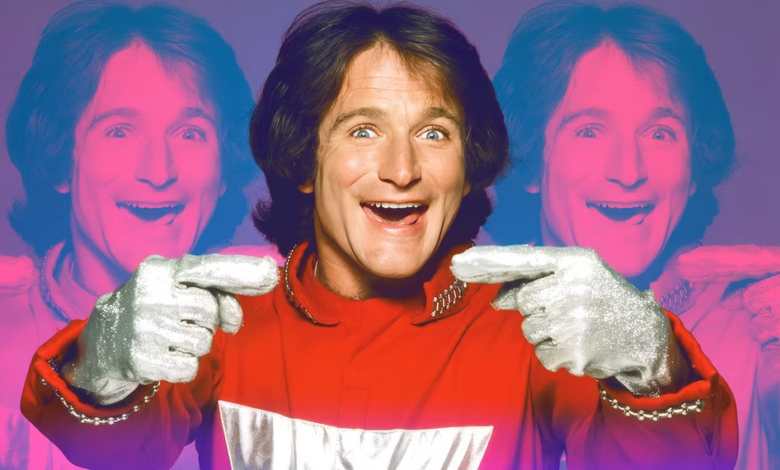
Making the transition from one entertainment mode to another is no easy feat. Whether segueing from music into acting, stage into television, or television into film, only a select and versatile few find such success across mediums. One prominent example lies in the career of a powerhouse, classically-trained performer who hailed from Julliard. Rising through San Francisco’s stand-up comedy scene in the 1970s, Robin Williams burst onto the small screen as the alien Mork on Happy Days. His antics and sensibilities hit big with audiences after just one episode, and in short order, the comedian-turned-actor was given a starring role in a spin-off television series, Mork and Mindy. Thanks to the character’s success, what would become a beloved, decades-long career in entertainment was swiftly underway.
How Was Mork Created?
By 1978, Happy Days was nearly halfway through its 10-year run on television. The prior year saw the release and massive success of Star Wars, inspiring show creator Garry Marshall‘s young son to suggest including an alien in the popular series. Though the idea was explored and a script was written, the concept was initially met with skepticism. Actor Ron Howard would later admit, “It was an episode that didn’t read so great,” and his co-star Anson Wiliams more harshly echoed the sentiment by deeming it “the worst script in the history of Happy Days…it was unreadable, it was so bad.” But as fate would have it, the lightning-in-a-bottle alchemy that occurs when the right performer is paired with the right material can do wonders.
How Was Robin Williams Cast as Mork?
Despite reservations from his cast, Garry Marshall moved forward with the concept. After several people turned the part down, including Dom DeLuise, an actor was hired but ultimately proved ill-fitted for the character. Just days before taping the episode, the role had yet to be cast, and accounts vary as to how Robin Williams nabbed the role. According to actor Al Molinaro, he recommended Williams to Marshall after seeing the actor in an improvisation class, and casting director Ronny Hallin agreed. Per Marshall’s memory, “Ronny told me about this funny guy, Robin, who performed on the street. People would put money in his hat.” Though he was wary of casting such a performer, Hallin assured Marshall that “the hat’s pretty full.”
When he auditioned, Robin Williams made an immediate, lasting impression and won the part. Marshall remembers, “I will never forget the day I met him and he stood on his head in my office chair and pretended to drink a glass of water using his finger like a straw.” The enthusiasm for Williams continued into the episode’s run-through. Quick-witted, verbally and physically adept, and downright hilarious, the unknown comedian blew his colleagues away and was described as a combination of “all three Marx Brothers, Chaplin, the Three Stooges, and William F. Buckley in the same body.”
Robin Williams Becomes a Household Name
On February 28, 1978, five months after Happy Days infamously “jumped the shark,” the world was introduced to a humanoid alien from the planet Ork. Just days prior, Robin Williams had rehearsed with the show’s cast and crew for his debut, and even before cameras officially rolled, people were in awe of the 26-year-old from San Francisco. Ron Howard remembers, “He started improvising instantly. It was the most amazing thing,” and Henry Winkler described the experience of working with Williams as being “in the presence of greatness and my job here is to get out of his way.”
The actor’s debut as Mork was a smash hit with audiences, and it quickly became evident that Williams was a comedic force to be reckoned with. His work on Happy Days featured many of what would become performative trademarks. Speaking in rapid-fire cadence, improvising with his environment, and creating sound effects like a human Foley machine, he chewed the scenery around his co-stars and delivered a performance of singular, lightning-in-a-bottle creativity. Garry Marshall said of the crowd’s reaction, “At the end of the episode, 300 people in the audience stood up and applauded, which is not usually done. It didn’t take a genius to know he could do his own show.”
A Spin-Off Show and Prolific Film Career
Only seven months after his debut, the alien from Ork returned to TV screens in the spin-off series Mork and Mindy. Co-starring Pam Dawber as Mork’s titular friend and roommate, the sitcom ran for 95 episodes over four seasons. So confident that the series would be a hit, the production team began work without a treatment or pilot episode. Providing a platform for Williams to develop his performative skills, and simultaneously giving him a great deal of exposure in the entertainment industry, the series undoubtedly catapulted him to the big leagues. In addition to his unique comedic voice, his methods for working would famously have a lasting impact on the technical side of sitcoms, with his manic energy, unpredictable physicality, and tendency to improvise necessitating an additional camera on the soundstage. Garry Marshall’s son, Scott, remembers, “The sitcom up until then was always three cameras. So he brought in a fourth camera, kind of a hand-held camera just to follow Robin. And that became the standard. Now every sitcom has four cameras now because of that.”
Despite Williams’ popularity and the influence he was bringing to sitcoms in particular and comedy more generally, the actor eventually became disillusioned with the character of Mork. In his defense, Mork and Mindy was already a long shot regarding longevity, and he’d quickly wrung as much out of the paper-thin concept as he possibly could. Adding to his decreasing interest in playing the character, the series’ ratings began to drop dramatically after a change in time slots and various creative decisions. The final episode aired on May 27, 1982, and was directed by Williams himself.
During Mork and Mindy‘s four-year run, Williams began transitioning to film acting, beginning with his live-action portrayal as Popeye in Robert Altman‘s infamous 1980 film. Though his career on the big screen kicked off with a whimper, he more than rebounded in subsequent years, ultimately becoming one of the world’s most prolific and beloved stars. Considering that a one-off guest spot on Happy Days is where it all began, it’s safe to say the legend’s one-of-a-kind approach to performance spoke for itself and paid off in droves.

